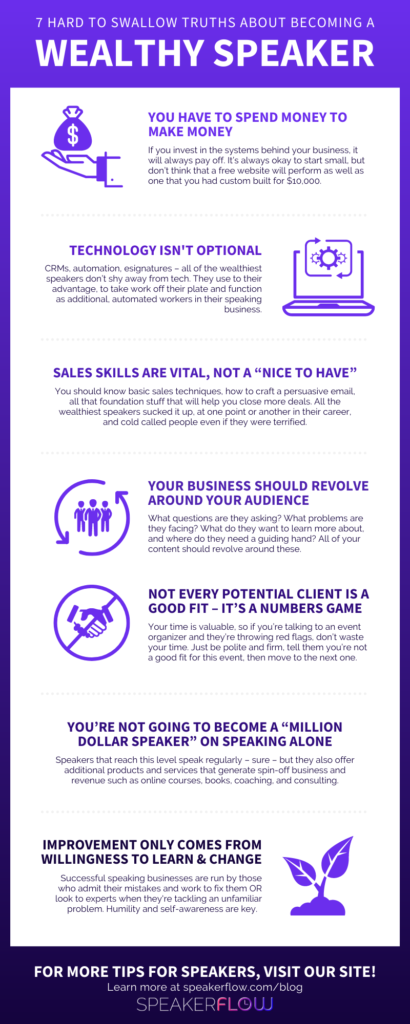No matter where you’re at in your speaking career, odds are you’re working towards becoming a wealthy speaker. Getting paid to speak is a real accomplishment, and it shows your value as a thought leader. However, there are some hard truths to swallow about the reality of becoming a wealthy speaker.
Though you likely already know there isn’t a magic formula for success, it’s a slow road to the top. Online gurus and so-called “entrepreneur” coaches are quick to sugarcoat the reality of speaking and getting paid in this industry. This guide is an opportunity to pull back the curtains to deliver some of the real-world truths about making money as a speaker.
Believe it or not, none of these truths relate to your speaking abilities, experience level, or background. Anyone can be a great speaker. You don’t need a fancy degree, credentials, or big-name companies behind you to become a wealthy speaker. It comes down to how you position yourself as a leader in your space, as well as your own skills as a marketer.
When clients pay you to speak, they’re not booking you for that specific time. They’re paying for your experience, personality, and ability to communicate with your audience. Event planners aren’t booking speakers. They’re booking expertise and specialists. Coming to terms with what it really means to be a wealthy speaker comes with time. However, the sooner you swallow these hard truths, the easier it is to take your speaking gig to the next level.
- You have to spend money to make money.
- Technology is no longer an optional part of a speaking business.
- Sales skills are imperative (not “nice to have.”)
- Every part of your business should revolve around your audience.
- Not every potential client is a good fit – it’s a numbers game.
- You’re not going to become a “million-dollar speaker” on speaking alone.
- Improvement only comes from a willingness to learn and change.
You have to spend money to make money.
First, you have to treat speaking as its own business. This means the biggest rule of business applies: you have to spend money to make money. If you invest in your business and the systems behind it, it pays off. While it’s always okay to start small, there comes a point when you need to make real investments.

There are some areas of your business you should always invest in if you can. Taking advantage of any profits you have to reinvest back into the business is the only way to grow. Where should you spend your money if you want to make money as a wealthy speaker?
- Marketing: To start, you need the right marketing tools. This means a well-designed, professional website and branding. Sure, you can create a free website in a few minutes, but it will never perform as well as one created for you by a professional. With 94% of your website’s first impression based on the visuals and design, you can’t overlook this.
- Training: You also need to invest in your own training and skills. This is far from one-and-done. There is always more to learn about speaking, your industry, and how to grow.
- Outsourcing: Similarly, you don’t have to do everything yourself. In fact, you shouldn’t. By outsourcing things that are too time-consuming, you get more time to focus on the parts of your speaking business that make you money.
- Equipment: Lastly, you should always be searching for the right equipment, software, and tools to run your business smarter (not harder). While you don’t need to completely change your setup, investing in ways to boost efficiency makes all the difference.
Technology is no longer an optional part of a speaking business.
Second, we’re officially in a tech-focused world. Technology can’t be an afterthought in your speaking business. Things like CRMs, automation, esignatures, and so on are the new normal. The wealthiest speakers aren’t afraid to jump head-first into the latest tech trends. They use these to their advantage, creating more efficient systems.

Even if you’re a one-person team, you don’t have to handle everything alone. In the speaking space, these tools save you both time and money. What tech tools are in every wealthy speaker’s toolkit?
- Customer Relationship Management System (CRM): First, a speaker CRM manages all the important information about leads, clients, and organizations. It’s hard to keep track of event planners, other speakers, and people you need to know. A CRM organizes this in one place, making sure you don’t miss any opportunities.
- Content manager: Next, a content management tool like WordPress or SquareSpace helps manage your digital content. If you’re creating a blog or publishing any content as part of your content marketing strategy, you want to make this as easy as possible.
- Social media scheduler: Staying top-of-mind on social media is how you build an audience, but you don’t have to be online 24/7. Instead, using a social media scheduler like Hootsuite or Edgar ensures you always have fresh content.
- Email marketing app: Getting the word about your new offerings, gigs, and so on takes an active effort. Every wealthy speaker has an engaged email list, and this means you need an email marketing app like Mailchimp.
- Project manager: Last but not least, juggling your latest projects and goals can be tricky as a wealthy speaker. A project management tool like Asana helps you focus on the big-picture.
Sales skills are imperative (not “nice to have.”)
Next, wealthy speakers know sales skills aren’t optional. Though the word “sales” often has a negative connotation, it’s time to change this definition. You don’t have to go full car salesman to be successful in sales. In fact, it’s best you don’t go that route at all. However, you need to know basic sales techniques.

What exactly makes up a speaker’s sales technique? While this varies by industry, the basics are the same. First, you need to know how to craft a persuasive email, make a cold call with confidence, and network within your industry. You need to know how to deliver a basic elevator pitch and identify your strengths and weaknesses.
All the wealthiest speakers have developed their own sales skills, and they know what a difference this makes. Landing sales isn’t rocket science. Much of it comes down to being likable and relatable. The rest is related to luck and responsiveness. In fact, between 30% and 50% of sales go to the vendor or business that responds first. The sooner you learn that sales skills are important, the better.
One of the draws to speaking as a form of income is the low cost of entry. As we said before, great speakers come from anywhere. There’s no single “right” look, experience, or background. However, you still need the right sales foundation to stand out. In an industry that’s about first impressions and relationships, you can’t leave this as an afterthought.
Every part of your business should revolve around your audience.
Fourth, another hard truth to swallow about becoming a wealthy speaker is that every decision you make needs to revolve around your audience. Just as you customize your keynotes to suit your audience, your sales and marketing need to be built around your audience as well. Who is your target audience? What are they looking for? What problems do they wish to solve?

When you market yourself and your content as a solution to your audience’s problem, sales come naturally. It’s not just about creating content that you find interesting. It’s about creating content with your audience in mind. This means you first need to understand your audience. If you don’t know who you’re marketing to, you might as well be shouting into the void.
Not sure where to begin? Start by answering these questions below:
- What is the age of your demographic?
- What is the income level of your audience?
- Where is your audience located?
- Who is competing with you for your audience’s attention?
- What concerns or problems does your audience have?
When you begin to consider yourself in relation to your audience, you start thinking like a wealthy speaker. From there, genuine connections follow. Continue to learn from your audience’s feedback, growing your understanding of what’s the most helpful to them.
Not every potential client is a good fit – it’s a numbers game.
Similar to knowing your audience, you also need to recognize that not every client is the right fit. As the saying goes, it’s not about what you know but who you know. Sales and marketing is largely a numbers game. Your time is valuable. If you’re struggling to land the deal with a lead, you need to know when it’s time to move along. This is when it’s important to notice potential red flags, like arguing for a discount, right away.

At least 50% of your prospects are the wrong fit for your business. It’s always okay to be polite and firm in your decision. You don’t want to work for any event. You want the right event. A poor fit runs the risk of going badly, possibly creating an even worse impression long term. You’ll quickly learn that sales and networking is a numbers game. The more people you know in your industry, the better. Just don’t expect every person to be the perfect fit for your goals.
When do you know if a potential client is the right fit? If you’re comfortable with them, and you have similar goals, odds are you’re on the right track. The more experience you have, the easier it becomes to spot quality, right-fit clients early on. You might have to wade through some bad apples to find the perfect treat.
You’re not going to become a “million-dollar speaker” on speaking alone.
Next, this truth might be the hardest to swallow of all. While there is such a thing as “million-dollar speakers,” you’re not going to get there by speaking alone. It’s true that speakers at this top level speak regularly, but that’s not their only form of revenue. They usually offer additional products and services that create spin-off businesses and revenue. These take many forms:

- Online courses
- Books
- Workbooks
- Consulting services
- Executive workshops
- Programs or memberships
- Sponsorships and affiliates
If there’s one thing we can learn from the COVID-19 pandemic, it’s that you should never get too comfortable. Things can change in an instant. Though the speaking industry is adaptable, it’s not unbreakable. The best speakers know how to diversify their revenue streams, making the most of their skills.
While earning an income from speaking is a great goal, it shouldn’t be your only goal. It’s more likely you’ll find success speaking in addition to other income streams. Creating a brand for yourself as a thought leader is the best way to lay a strong foundation for your speaking business and beyond.
Improvement only comes from a willingness to learn and change.
Last but not least, you’ll only improve if you’re willing to learn and change. The best wealthy speakers aren’t stuck in their ways. Not only do they expect change, but they embrace it fully. It’s normal to make mistakes as a business owner and speaker. Though the concept of “entrepreneur” is largely romanticized today, it’s really about being a cutting-edge thinker in your space.

As Bill Gates famously said, “It’s fine to celebrate success, but it’s more important to heed the lessons of failure.” If you’re willing to learn from your mistakes and do better, you’re unbeatable. To grow, identify both your strengths and your weaknesses. Learn from the mistakes of others, and make it a habit to continue learning.
Nobody’s perfect, not even the big-name wealthy speakers you see on stage. The only difference is they have a career of learning behind them, and you have the same ahead of you. If you’re willing to keep an open mind and treat every challenge as a chance to develop, you’re on the right track.
In conclusion, wealthy speakers come from everywhere. However, these speakers set themselves apart because they know better than to believe some of the biggest myths about speaking. They understand that it takes the right tools, skills, and commitment to truly stand out.
You don’t get very far by staying in place. If you’re ready to become a wealthy speaker, start by swallowing these truths above. When you’re realistic about your expectations and goals, you accomplish more than you set your mind to.







